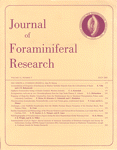
JOURNAL OF FORAMINIFERAL RESEARCH
metrics 2024
Unveiling the Mysteries of Foraminifera and Their Environments
Introduction
JOURNAL OF FORAMINIFERAL RESEARCH is a premier academic journal published by the Cushman Foundation for Foraminiferal Research, dedicated to advancing the field of foraminiferal studies within the broader disciplines of paleontology and microbiology. Established in 1979, this journal has been a vital publication for researchers aiming to explore the intricate relationships between foraminifera and their environments, contributing to a deeper understanding of earth's history. With a Q4 ranking in Microbiology and a Q3 ranking in Paleontology as of 2023, it plays an essential role in shaping scholarly discourse in these areas. Although it currently does not offer open access, the journal remains a valuable resource for scientists, professionals, and graduate students eager to engage with contemporary research findings and methodologies. The subtle interconnections between foraminiferal research and broader ecological implications underscore the journal's commitment to fostering academic inquiry, making it an indispensable ally for those invested in the ongoing scientific exploration of our planet.
Metrics 2024
 0.38
0.38 0.90
0.90 1.40
1.40 65
65Metrics History
Rank 2024
Scopus
IF (Web Of Science)
JCI (Web Of Science)
Quartile History
Similar Journals

FACIES
Advancing Earth Science Insights Through Rigorous ResearchFACIES is a prominent academic journal published by Springer, dedicated to advancing knowledge in the fields of Geology, Paleontology, and Stratigraphy. With its rich history since 1979 and an impactful convergence of research efforts extending through 2024, FACIES has established itself as a vital resource for scholars and practitioners. The journal boasts impressive ranking metrics: it is positioned in Q2 within Geology and Stratigraphy, and Q1 in Paleontology, reflecting its high-quality contributions to the academic community. Furthermore, its notable Scopus ranks—#28 in Paleontology, #16 in Stratigraphy, and #91 in Geology—underscore its influence and relevance. Although not an open-access journal, FACIES continues to provide significant findings that inform geological practices and enrich our understanding of past and present Earth systems. It serves as an essential platform for innovative research, making it invaluable for researchers, professionals, and students who seek to impact the fields of Earth sciences.

Swiss Journal of Palaeontology
Exploring Evolution Through Fossil InsightsSwiss Journal of Palaeontology, published by SPRINGER INT PUBL AG, stands as a leading platform for innovative research within the field of paleontology, contributing significantly to the understanding of Earth's historical life forms and their evolutionary pathways. With its ISSN 1664-2376 and E-ISSN 1664-2384, this journal has established a strong presence in academic circles, recognized as a Q1 journal in the category of Paleontology for 2023. Moreover, it ranks 20th out of 113 in the Earth and Planetary Sciences, securing an impressive 82nd percentile on Scopus, underscoring its influence and reach in the scientific community. The journal publishes cutting-edge research findings, theoretical advancements, and comprehensive reviews that span the globe, making it an essential resource for researchers, professionals, and students in the paleontological sciences. For those interested in contributing to and learning from the latest discoveries, the Swiss Journal of Palaeontology promises to be an invaluable addition to your academic library.
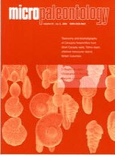
MICROPALEONTOLOGY
Connecting Ancient Worlds to Modern ScienceMICROPALEONTOLOGY is a prominent journal dedicated to advancing the field of paleontology, published by MICRO PRESS. With an ISSN of 0026-2803 and an E-ISSN of 1937-2795, this esteemed publication has been a vital resource since its inception in 1979, continuing to influence the field through 2024. The journal ranks within the Q2 category for Paleontology, highlighting its relevance and quality in the academic community. Notably, it holds a Scopus rank of #41 out of 113 within the Earth and Planetary Sciences field, placing it in the 64th percentile, indicative of its significant impact. Although not an open-access journal, MICROPALEONTOLOGY remains committed to disseminating crucial research findings, making it an essential platform for researchers, professionals, and students dedicated to exploring the intricacies of microfossils and their implications for understanding past environments. With its strategic focus and rigorous peer-review process, this journal plays a critical role in bridging past geological events with contemporary scientific inquiries.

CARNETS DE GEOLOGIE
Your Gateway to Cutting-edge Geological ResearchCarnets de Geologie is a prominent open-access journal dedicated to the dynamic fields of geology, paleontology, and stratigraphy. Published by Carnets Geologie and based in France, the journal has been a platform for scholarly communication since 2002, facilitating unrestricted access to high-quality research. With a robust impact reflected in its 2023 quartile rankings—Q2 in Geology, Paleontology, and Stratigraphy—Carnets de Geologie ranks favorably within Scopus, positioning itself at the 60th percentile for Earth and Planetary Sciences. The journal aims to disseminate innovative research findings and foster academic discourse among researchers, professionals, and students interested in the intricate aspects of Earth's history and processes. Encompassing a broad scope that reflects continuous developments in the geological sciences, Carnets de Geologie is dedicated to advancing knowledge and understanding within its community.
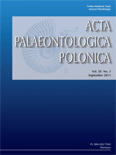
ACTA PALAEONTOLOGICA POLONICA
Showcasing Innovative Research in PaleontologyACTA PALAEONTOLOGICA POLONICA is a leading scholarly journal in the field of paleontology, published by the Institute of Paleobiology, Polish Academy of Sciences. With its open access model established since 1956, the journal ensures that vital research related to Earth's history and the evolution of life is freely accessible to a global audience. Based in Warsaw, Poland, this journal has garnered a respectable impact within the academic community, currently positioned in the Q2 quartile of its field and ranking #47 out of 113 in Scopus for Earth and Planetary Sciences, reflecting its significance in advancing paleontological research. Covering a wide range of topics related to fossil studies and evolutionary biology, ACTA PALAEONTOLOGICA POLONICA serves as a crucial platform for researchers, professionals, and students alike, encouraging the dissemination of innovative ideas and discussions that contribute to our understanding of past life on Earth. As it continues to publish high-quality articles through to 2024 and beyond, this journal remains integral to the ongoing discourse in paleontological sciences.

Gondwana Research
Exploring the Depths of Gondwana's Geological LegacyGondwana Research is a premier academic journal published by Elsevier, specializing in the field of geology, with a robust focus on the geological history and processes of the Gondwana supercontinent. With an impressive impact factor and ranking as Q1 in the 2023 Geology category, it stands as a leading platform for disseminating high-quality research. The journal features articles that advance the understanding of Earth and planetary sciences, making significant contributions to geological education and research. Researchers will find its curated content particularly valuable, as it encompasses a wide array of topics including stratigraphy, paleontology, and tectonics, all relevant to both contemporary and historical geological inquiries. Given its substantial reach and esteemed standing—ranked 5th out of 321 in its field—Gondwana Research plays a crucial role in fostering scientific exchange among global experts. Located in the United States with publication continuity from 1997 to 2024, this journal consistently attracts submissions from leading scientists, ensuring that its readership is kept at the forefront of geological discovery and innovation.

BULLETIN OF GEOSCIENCES
Exploring the Dynamics of Our Planet, One Study at a TimeBULLETIN OF GEOSCIENCES, published by the prestigious Czech Geological Survey, stands as a pivotal resource in the fields of Earth and Planetary Sciences and Environmental Science. Since its inception in 2003, the journal has been committed to advancing knowledge through high-quality research, currently holding a commendable Q2 ranking in both disciplines. With its focus on diverse and innovative topics, BULLETIN OF GEOSCIENCES provides an essential platform for researchers, professionals, and students aiming to disseminate and access impactful studies. The journal is indexed in Scopus, ranking #78/195 in General Earth and Planetary Sciences and #110/233 in General Environmental Science, reflecting its significant contribution to academia. Publishing from Prague, Czech Republic, this journal invites contributions that illuminate the interactions between geological processes and environmental phenomena, ensuring an inclusive and accessible approach to crucial global issues.
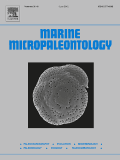
MARINE MICROPALEONTOLOGY
Diving Deep into Paleoenvironmental InsightsMARINE MICROPALEONTOLOGY, published by Elsevier, is a prestigious journal that has been at the forefront of research in the fields of Oceanography and Paleontology since its inception in 1976. Renowned for its high-impact contributions, the journal is classified in Q2 in Oceanography and Q1 in Paleontology, reflecting its significant role in advancing knowledge and understanding within these scientific domains. With an impressive Scopus ranking—27th in Paleontology and 53rd in Oceanography—this journal serves as an invaluable platform for researchers and professionals to disseminate their findings on marine microfossils and their implications for paleoenvironmental reconstructions. While the journal is not open access, its rigorous peer-review process ensures that published articles maintain the highest scientific standards. Researchers, professionals, and students alike are encouraged to explore the latest insights and discoveries that shape our understanding of marine ecosystems through the pages of MARINE MICROPALEONTOLOGY.
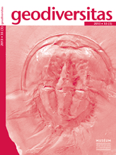
GEODIVERSITAS
Elevating Earth Science Discourse GloballyGEODIVERSITAS, an esteemed journal published by the Museum National d'Histoire Naturelle, represents a significant contribution to the fields of geology and paleontology. With an ISSN of 1280-9659, this peer-reviewed publication has established itself as a vital resource for researchers, professionals, and students alike, disseminating high-quality and innovative research since its inception in 2002. Covering a broad spectrum of topics within earth sciences, GEODIVERSITAS not only showcases cutting-edge studies but also fosters a deeper understanding of geological and paleontological phenomena. Ranked in the Q2 category of both geology and paleontology for 2023, the journal exemplifies rigorous scholarly standards and makes significant strides in enhancing knowledge within these disciplines. With its headquarters in Paris and a commitment to scientific excellence, GEODIVERSITAS stands as a leading voice in contemporary earth science research, inviting contributions that drive forward the conversation in geology and paleontology.

PALAEONTOLOGIA ELECTRONICA
Empowering Scholars with Unrestricted Access to Fossil DiscoveriesPALAEONTOLOGIA ELECTRONICA is a distinguished open-access journal published by COQUINA PRESS, offering a vital platform for the dissemination of cutting-edge research in the fields of Paleontology and Oceanography. Launched in 1998, this journal has continuously fostered scholarly communication, allowing unrestricted access to scientific findings and contributing significantly to the advancement of the field. With an impressive track record since its inception, PALAEONTOLOGIA ELECTRONICA holds a 2023 Scopus ranking of #39 out of 113 in the Paleontology category, demonstrating its value among academic resources as evidenced by its Q2 quartile ranking. The journal is based in the United States, and it encourages submissions that span a diverse range of topics, from fossil analysis to evolutionary biology. As a prominent resource for researchers, educators, and students alike, it plays a crucial role in shaping the future of paleontological study.